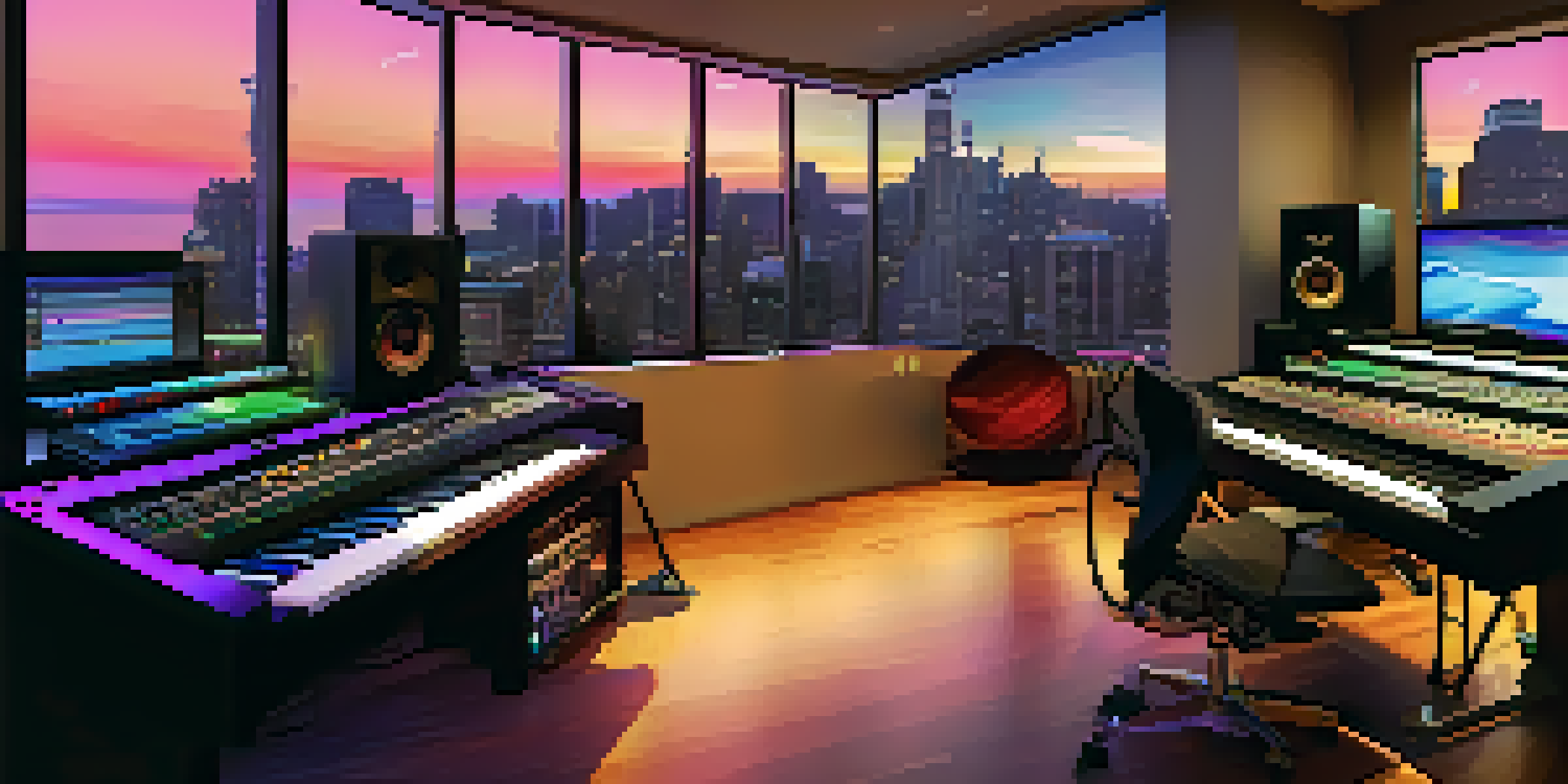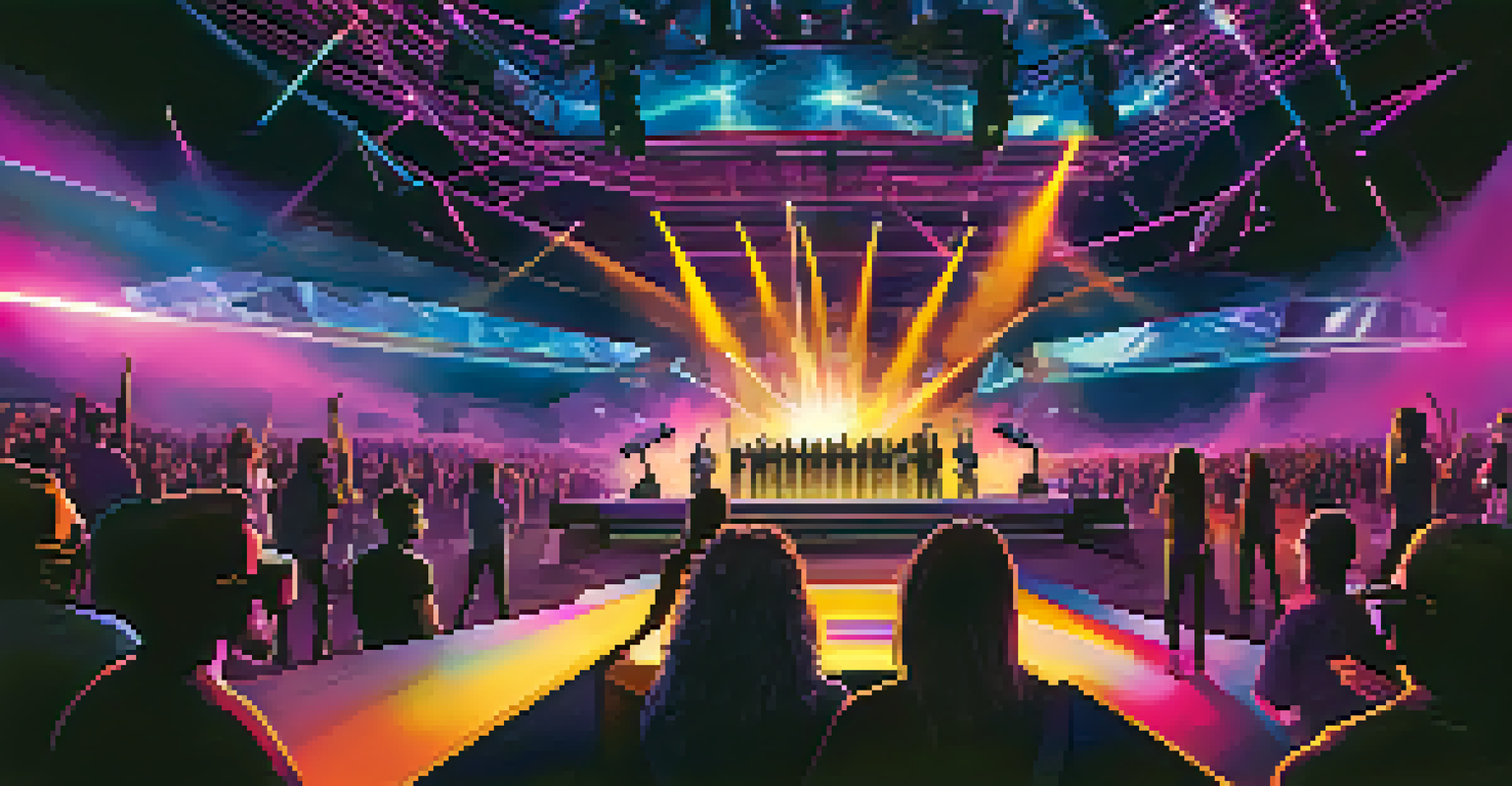The Future of Music Production: Tools and Technology Trends

The Rise of Artificial Intelligence in Music Production
Artificial Intelligence (AI) is transforming how we create music, enabling producers to generate melodies, harmonies, and even entire tracks with minimal input. Tools like OpenAI's MuseNet and AIVA can compose original pieces in various styles, making the creative process more accessible than ever. Imagine having a virtual collaborator that can come up with a unique riff while you focus on other aspects of your project.
Music is the shorthand of emotion.
As AI continues to evolve, it's not just about generating music; it's also about enhancing the production process. AI-driven tools can analyze audio tracks, suggest improvements, and even help with mixing and mastering, ensuring that budding producers can achieve professional-sounding results. This means that the gap between amateur and professional production is narrowing.
However, while AI brings exciting possibilities, it also raises questions about creativity and authenticity. Will music lose its human touch as machines take on more creative roles? It's a conversation worth having as we embrace these advancements in our artistic endeavors.
Cloud-Based Collaboration: Making Music Anywhere
The era of cloud-based collaboration has arrived, allowing musicians and producers to work together regardless of physical location. Platforms like Splice and Soundtrap enable users to share projects, collaborate in real-time, and access a vast library of sounds and samples. This flexibility is crucial in today’s fast-paced music industry, where time is often of the essence.

Imagine a songwriter in New York teaming up with a beatmaker in Tokyo, crafting a track that blends their unique styles seamlessly. Cloud technology not only fosters creativity but also democratizes music production, making it easier for anyone with an internet connection to contribute to a project. This shift has led to a surge in diverse sounds and genres entering the mainstream.
AI Transforms Music Creation
Artificial Intelligence is revolutionizing music production by enabling the generation of original compositions and improving the overall production process.
Moreover, these platforms are continually evolving, introducing features that enhance the user experience. With built-in tools for collaboration, feedback, and version control, musicians can streamline their workflows and focus more on the art of creation, making music production a more enjoyable and efficient process.
The Role of Virtual Reality in Music Experiences
Virtual Reality (VR) is not just for gaming; it’s making waves in the music industry, too. Artists are exploring VR to create immersive experiences, allowing fans to engage with their music in ways previously unimaginable. Imagine attending a concert where you can explore the stage, interact with band members, and feel like you're part of the performance—all from your living room.
The best way to predict the future is to create it.
This technology opens up new avenues for music production, enabling artists to visualize their soundscapes and create interactive music videos. Tools like Oculus Venues and Wave are paving the way for a new form of live entertainment, blending music with cutting-edge technology. As this trend grows, it could redefine how we experience music altogether.
However, as with any emerging technology, there are challenges to overcome. The need for specialized equipment and a steep learning curve can be barriers for some artists. Yet, as VR becomes more accessible, it's likely we'll see a surge in innovative musical experiences that captivate audiences worldwide.
Sustainability in Music Production: Going Green
Sustainability is a hot topic across industries, and music production is no exception. With growing awareness about climate change, many producers are seeking eco-friendly alternatives in their workflows. This includes using renewable energy sources for studios, opting for sustainable materials in instruments, and reducing waste in the recording process.
For instance, some artists are now choosing to produce music digitally rather than using physical media, which can significantly cut down on carbon footprints. Additionally, eco-conscious labels are emerging, promoting artists who prioritize sustainability in their practices. This trend not only benefits the planet but also resonates with fans who value environmental responsibility.
Cloud Collaboration Revolutionizes Music
Cloud-based platforms allow musicians to collaborate seamlessly from anywhere, fostering creativity and democratizing music production.
As technology advances, we can expect more innovations aimed at reducing the environmental impact of music production. From energy-efficient equipment to sustainable touring practices, the future of music might very well harmonize with the principles of eco-friendliness.
The Influence of Streaming Services on Music Production
Streaming services like Spotify and Apple Music have revolutionized how we consume music, and they are also influencing how it's produced. With the rise of playlists and single releases, artists are adapting their production strategies to cater to these platforms. Shorter song lengths and catchy hooks are becoming more common, as producers aim to capture listeners’ attention quickly.
Moreover, streaming analytics provide valuable insights into listener behavior, guiding artists in their creative decisions. By understanding what resonates with audiences, producers can tailor their sound to meet market demands. This data-driven approach allows for more strategic releases and marketing efforts, maximizing an artist's reach.
However, this shift also raises questions about artistic integrity. Are musicians compromising their originality to fit into streaming algorithms? It's a balancing act that many artists are navigating as they seek to maintain their voice while also achieving commercial success in a competitive landscape.
Emerging Genres and the Global Music Scene
The global music scene is more interconnected than ever, leading to the rise of new genres that blend cultural influences. Thanks to technology and the internet, producers can easily access sounds from around the world, creating unique fusions that resonate with diverse audiences. Genres like K-pop and reggaeton have gained immense popularity, showcasing the power of cross-cultural collaboration.
This trend is not just about borrowing sounds; it's about creating a dialogue between artists from different backgrounds. Collaborative projects often result in innovative music that challenges traditional genre boundaries, inviting listeners to explore new sonic landscapes. Producers who embrace this global perspective can tap into a vast pool of creativity and inspiration.
Sustainability in Music Production
As awareness of climate change grows, music producers are increasingly adopting eco-friendly practices in their workflows.
As we look to the future, we can expect to see even more genre-blending and experimentation. The accessibility of production tools and the rise of social media will continue to shape how music is created and consumed, encouraging artists to push the envelope and redefine what music can be.
The Evolution of Music Software and Plugins
Music production software, or Digital Audio Workstations (DAWs), is constantly evolving to meet the needs of modern producers. Tools like Ableton Live, Logic Pro, and FL Studio are integrating new features that enhance creativity and streamline workflows. From advanced MIDI editing to intuitive user interfaces, these updates make it easier for artists to bring their visions to life.
Plugins also play a crucial role in music production, offering endless possibilities for sound manipulation and enhancement. With the rise of cloud-based plugin services, producers can access a vast library of sounds without the need for extensive storage. This flexibility allows for experimentation and innovation, as artists can try out different tools without commitment.

As technology progresses, we can expect even more advancements in music software, including AI-assisted features and enhanced collaboration tools. These developments will empower producers to create more complex and polished tracks, pushing the boundaries of what’s possible in music production.